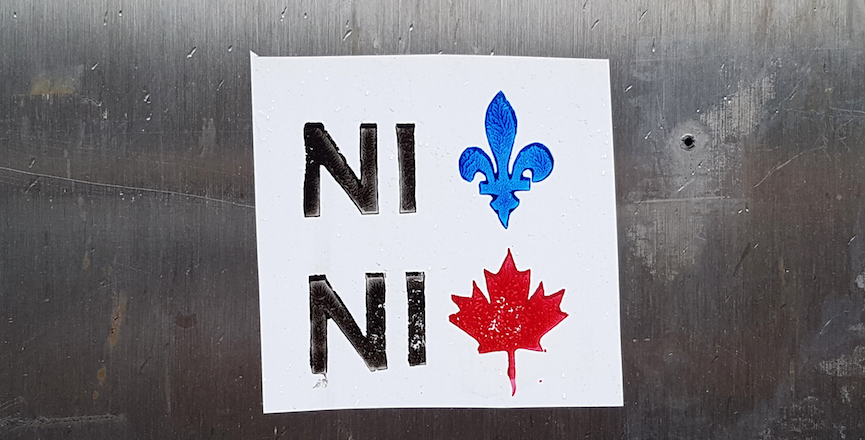U.S. President Donald Trump welcomed Poland’s president, a fellow traveller, to the United States Tuesday, saying, “Last summer, I had the privilege to . . . address the people of Poland about our shared commitment to defending our heritage and our civilization.”
It was carefully coded, like Make America Great Again, but the intent was: we are in a war of our civilization against others unlike us, so let us defend together.
The leader of Germany’s hard-right AfD party has attacked a dance piece by “local youths and young Syrian refugees” as “amateurish multiculturalism” aiming “to break down the difference between ourselves and the Other.” It means a “break with your national culture.” Steve Bannon, the high-end version of Trump, gets teary recalling how “our forefathers” defeated Islam at the gates of Vienna in 1683 or Tours in 742 (!) as if he was there.
This takes xenophobia a step beyond the fear of losing your job to Mexican rapists and murderers (or in the U.K. version, the “Polish plumber” — ironic, wot?). It’s about selfhood and identity: Us versus Them.
But it also exposes the incoherence of the civilizations/heritage argument. The best rebuttal to the existence of identifiable if not quite monolithic civilizations is Trump himself. Behold him! It’s as if the parts came together in a blizzard. Nothing fits properly and the separate bits contradict each other endlessly. He’s culturally incoherent. The last thing you think of is: here is the culmination of an admirable thing called Western civilization. What heritage? The deepest need of the movement to defend it is never to define it clearly.
We owe the late Edward Said for making this argument best and earliest when he challenged stereotypes of the Orient and “Arab world” as fabrications built by Europeans to help them conquer those regions — then challenging, by rebound, the notion of Western civilization itself. Of course there are human groupings, but they’re a huge, intersecting mishmash, hybrids and mongrels all.
It’s rough for many of us who grew up with these notions and took courses in Western Civ. One of my intellectual heroes, Harold Innis, spoke often about threats (mainly internal) to Western civilization. But he also had moments of doubt. (“It is perhaps a unique characteristic of civilization that each believes in its uniqueness and superiority. . . Indeed this may be the meaning of culture.”)
Why the recent resort to the war of civs argument, versus the tried-and-true, they’re-coming-for-your-job line? The latter may not be working well. A Pew poll last week showed 74 per cent Canadian support for welcoming refugees. I know refugees aren’t the same as immigrants but most people don’t draw a strong line, and they may be right. Why would anyone leave home, where they’re at ease, speak the language etc., if they didn’t feel a need to get out?
Pew found majority support even in Germany, Italy and the U.S., where hostility was strongest two years ago. Those populations are starting to grasp the economic need for outsiders. Trump’s racist response is to call for Norwegian, not Arab, immigrants — a sure sign of his logical western inheritance.
Is Canada welcoming because we have a weak “national culture?” It doesn’t hurt. I often ask students about their notions of Cancult. The main response is multiculturalism. I used to feel scorn for this as a weak basis for a national identity, but they don’t back down. They’re also unembarrassed by Tim Hortons (owned by Brazilians) or hockey as Cancult keystones. Maybe they’re just ahead of the curve and don’t plan to pass through the uglier phases of nationalism.
Quebec is where atavistic, race-tinged nationalism had its firmest Canadian grip. In its current election, the recently formed Coalition Avenir Québec party once looked unbeatable, based on Trumpian signals about the danger of Others. The main competing parties scrambled to concur. But, as the campaign unfolded, the CAQ faltered and the Liberals, especially, blushingly backtracked. Meanwhile, the overtly left, principled Québec Solidaire, has doubled its vote.
In the first English-language TV election debate ever (also a sign, n’est-ce pas?), the three male party leaders tried to yell over each other while QS leader Manon Massé said nothing and rolled her eyes. The camera loved it. TV debates are so fine.
Image: Coastal Elite/Flickr
This article originally appeared in The Toronto Star.
Help make rabble sustainable. Please consider supporting our work with a monthly donation. Support rabble.ca today for as little as $1 per month!





